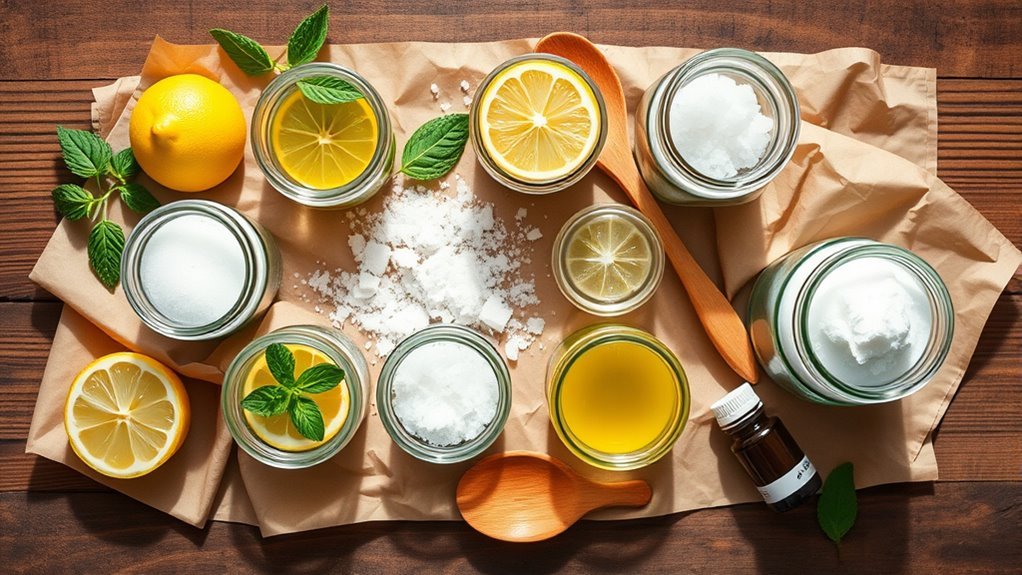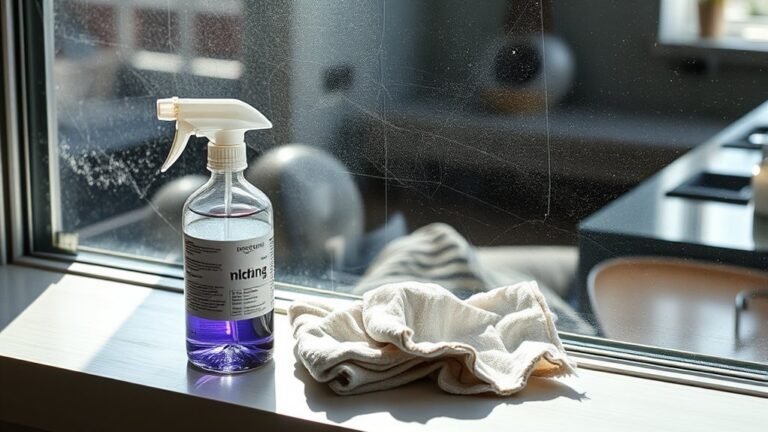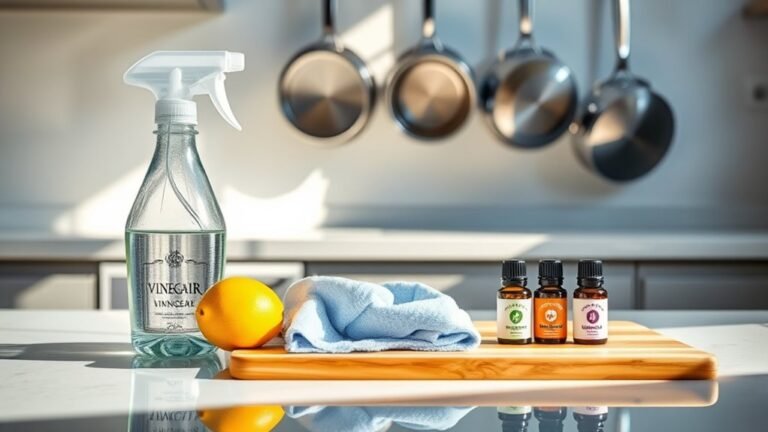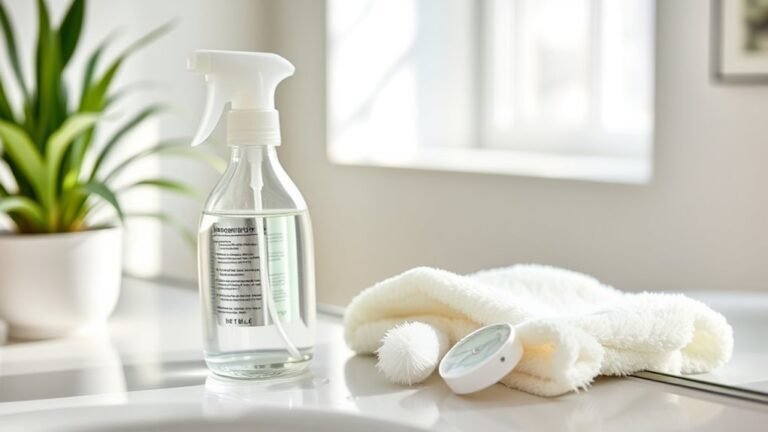10 DIY Natural Cleaning Products You Can Make at Home
You can make 10 effective DIY natural cleaners at home using simple ingredients like vinegar, baking soda, lemon, and essential oils. Try an all-purpose vinegar spray for counters, a baking soda scrubbing powder for tough stains, and citrus-olive oil polish for wood furniture. Use lemon and salt to clean sinks, Castile soap for dishwashing, and hydrogen peroxide to remove mold. There’s even a carpet deodorizer and natural toothpaste recipe. Keep exploring, and you’ll uncover even more easy, eco-friendly cleaning solutions.
All-Purpose Vinegar Spray

Vinegar is a versatile and natural cleaner you can easily make at home. When you embrace vinegar benefits, you access a powerful, eco-friendly tool that cuts through grime, disinfects surfaces, and leaves no harsh chemical residue. You’ll love how simple vinegar applications simplify your cleaning routine. Just mix equal parts white vinegar and water in a spray bottle, and you’ve got an all-purpose spray ready to tackle countertops, glass, and even bathroom fixtures. It’s perfect for anyone seeking freedom from expensive, toxic cleaners while maintaining a spotless space. Using this all-purpose vinegar spray not only saves money but also reduces your environmental impact. Give it a try—you’ll appreciate how effortlessly it fits into your natural cleaning lifestyle.
Baking Soda Scrubbing Powder
You’ll only need a few simple ingredients to make your own baking soda scrubbing powder. It’s great for tackling tough stains and grime around your home. Let’s go over what you’ll need, how to prepare it, and the best ways to use it.
Ingredients Needed
To make an effective baking soda scrubbing powder, you’ll need just a few simple ingredients that are likely already in your kitchen. Using natural ingredients means you’re choosing a path of sustainable cleaning that’s gentle on both your home and the environment. Here’s what you’ll gather:
- Baking soda: the base for scrubbing power and odor neutralizing
- Citric acid or cream of tartar: adds fizz and extra cleaning strength
- Cornstarch: helps absorb moisture and keep the powder dry
- Essential oils (optional): for a fresh scent without synthetic chemicals
With these ingredients, you can whip up a versatile, eco-friendly scrubbing powder that frees you from harsh chemicals, giving you the freedom to clean naturally and effectively.
Cleaning Uses
Now that you have your baking soda scrubbing powder ready, it’s time to put it to work around your home. You can use it as one of the best eco friendly alternatives to harsh chemical cleaners. Sprinkle it on surfaces like sinks, countertops, and stovetops, then scrub gently to lift stains and grime without damaging finishes. It’s also great for revitalizing cutting boards and deodorizing carpets. Beyond scrubbing, this powder acts as a mild natural disinfectant, helping reduce bacteria while keeping your space safe and toxin-free. Whether tackling bathroom tiles or cleaning your fridge, you’re choosing a powerful yet gentle approach that supports your health and the planet. Embrace this simple, effective solution to clean freely and naturally every day.
Preparation Steps
Creating your own baking soda scrubbing powder involves just a few simple ingredients and straightforward steps. With the right preparation techniques, you’ll enjoy a powerful, natural cleaner that’s safe and effective. Start by focusing on ingredient sourcing—choose pure baking soda and optional natural additives like citric acid or salt for extra scrubbing power. Here’s how to prepare your scrubbing powder:
- Measure 1 cup of baking soda as your base
- Add 1 tablespoon of citric acid or salt for enhanced cleaning
- Mix thoroughly in a dry bowl to avoid clumps
- Store in an airtight container to keep freshness
Citrus and Olive Oil Furniture Polish
Few natural ingredients can revitalize your furniture like citrus and olive oil. The citrus benefits are impressive—it naturally cleans, cuts through grime, and leaves a fresh scent. When combined with olive oil, you get a polish that not only cleans but also nourishes wood, restoring its shine and protecting it from drying out. To make your own, mix 1 part fresh citrus juice with 2 parts olive oil. Apply sparingly with a soft cloth, rubbing gently in the direction of the grain. This blend lets you maintain your furniture’s natural beauty without harsh chemicals, giving you freedom to care for your home naturally. Plus, it’s simple, affordable, and effective—a perfect DIY solution to keep your wood surfaces gleaming.
Lemon and Salt Sink Cleaner

You can tackle tough sink stains with just lemon and salt, a simple combo that’s both natural and effective. Making this cleaner at home is quick and requires only ingredients you probably already have. Let’s look at how easy it is to whip up this powerful stain remover.
Effective Stain Removal
Although many commercial cleaners promise tough stain removal, using natural ingredients like lemon and salt can be just as effective—and safer for your home. When tackling stains, these simple items not only clean but also promote natural fabric care and stain prevention methods that keep your belongings fresh without harsh chemicals. You can confidently remove stains while embracing freedom from synthetic toxins. Here’s why lemon and salt work well for you:
- Lemon’s natural acidity breaks down stains and disinfects.
- Salt acts as a gentle abrasive, lifting dirt without damage.
- Together, they brighten surfaces and fabrics naturally.
- This combo is eco-friendly and reduces exposure to harmful substances.
Easy Homemade Recipe
Lemon and salt don’t just tackle stains—they’re also perfect for cleaning your sink naturally and effectively. You can easily whip up this simple, eco friendly alternative using just these natural ingredients. Sprinkle coarse salt over your damp sink, then cut a lemon in half and use it to scrub the surface. The salt acts as a gentle abrasive, lifting grime without scratching, while the lemon’s acidity breaks down buildup and leaves behind a fresh scent. Rinse with warm water, and your sink will gleam without harsh chemicals. This DIY cleaner gives you the freedom to maintain a spotless kitchen using safe, biodegradable components you probably already have at home. It’s a small change that makes a big impact, keeping your space clean and the planet happy.
Castile Soap Dishwashing Liquid
One simple ingredient that can transform your dishwashing routine is Castile soap. Known for its castile soap benefits, this plant-based soap offers a powerful yet gentle clean, making it an excellent choice for eco friendly alternatives. When you switch to Castile soap dishwashing liquid, you’re not only caring for your dishes but also for the planet.
Here’s why you’ll love it:
- Biodegradable and safe for waterways
- Free from harsh chemicals and synthetic detergents
- Versatile for other cleaning tasks beyond dishes
- Gentle on your hands, reducing dryness
Essential Oil Glass Cleaner

You’ll love how essential oils not only add a fresh scent but also boost your glass cleaner’s effectiveness. Making your own cleaner is simple with just a few ingredients you probably already have. I’ll share a quick recipe and some tips to get your windows sparkling without streaks.
Benefits of Essential Oils
Although essential oils are often valued for their pleasant scents, they also offer powerful cleaning benefits that make them a natural choice for glass cleaners. When you use essential oils, you’re not just adding fragrance; you’re harnessing essential oil benefits that enhance cleanliness and freshness. Plus, the aromatherapy advantages elevate your cleaning routine, helping you feel calm and energized.
Here’s why essential oils stand out for your glass cleaning needs:
- Natural antibacterial and antiviral properties
- Cuts through grease and grime effectively
- Leaves a streak-free shine without harsh chemicals
- Infuses your space with uplifting, natural aromas
Homemade Glass Cleaner Recipe
A homemade glass cleaner with essential oils is an easy, effective way to keep your windows and mirrors sparkling without harsh chemicals. You’ll need distilled water, white vinegar, rubbing alcohol, and a few drops of your favorite essential oil like lemon or lavender. Combine 1 cup distilled water, 1 cup white vinegar, 1/4 cup rubbing alcohol, and 10-15 drops of essential oil in a spray bottle. Shake gently to mix. This blend supports glass cleaning by cutting through grime while leaving a fresh scent. When you use it, you’ll enjoy streak free shine that feels liberating compared to commercial cleaners loaded with toxins. Making your own cleaner puts you in control, giving you the freedom to maintain a healthy, sparkling home naturally.
Application Tips and Tricks
Now that you’ve mixed your natural glass cleaner, knowing how to apply it correctly can make all the difference in achieving a streak-free shine. Mastering simple application techniques guarantees your windows sparkle without hassle. First, spray the cleaner lightly to avoid excess moisture. Use a lint-free cloth or microfiber towel for wiping, as these materials prevent streaks. Wipe in a circular motion initially, then finish with vertical strokes for a flawless finish. Also, remember to store your product in a cool, dark place to keep essential oils fresh and effective. Here are some quick tips to keep in mind:
- Light, even spraying prevents drips
- Use microfiber cloths for best results
- Wipe with circular then vertical motions
- Store cleaner away from heat and sunlight
These steps give you full control and freedom over your cleaning routine.
Hydrogen Peroxide Mold Remover
Hydrogen peroxide is a powerful and natural option you can use to tackle mold in your home. Unlike harsh chemicals, hydrogen peroxide breaks down mold spores without releasing toxic fumes, giving you the freedom to clean safely and effectively. To use it, simply spray a 3% hydrogen peroxide solution directly onto the moldy area, let it sit for about 10 minutes, then scrub and wipe clean. This method not only removes mold but also helps with mold prevention by killing lingering spores. Remember to apply it regularly in damp or humid spots to keep mold at bay. With hydrogen peroxide, you’re choosing a simple, eco-friendly solution that empowers you to maintain a healthier living space on your own terms.
Cornstarch Carpet Deodorizer
Keeping your home fresh goes beyond just tackling mold—you’ll want to address odors that settle into your carpets as well. A simple, natural cornstarch carpet deodorizer offers an easy, effective solution. Thanks to cornstarch benefits like absorbing moisture and odors, it works as a fantastic carpet freshener without harsh chemicals.
Here’s how you can make and use it:
- Sprinkle cornstarch evenly over your carpet.
- Let it sit for 15-30 minutes to absorb odors.
- Vacuum thoroughly to remove cornstarch and trapped smells.
- Repeat as needed for persistent odors.
This DIY option gives you control over what goes into your home, keeping your space fresh and free from synthetic fragrances. Plus, it’s budget-friendly and super easy to whip up whenever you want!
Tea Tree Oil Bathroom Spray
One powerful way to naturally freshen your bathroom is with a tea tree oil spray. Tea tree’s antibacterial and antifungal properties make it perfect for tackling germs and mold that commonly build up in damp spaces. You can easily whip up your own spray by mixing 1 cup of water, 1/4 cup of white vinegar, and 10-15 drops of tea tree oil in a spray bottle. Just shake well before each use. Spray it on your sinks, tubs, tiles, and toilet surfaces to enjoy the bathroom benefits of a clean, fresh-smelling space without harsh chemicals. This DIY solution gives you the freedom to maintain a healthy environment while embracing natural, effective cleaning.
Baking Soda and Coconut Oil Toothpaste
A simple and natural alternative to commercial toothpaste is a blend of baking soda and coconut oil. This DIY toothpaste offers you the freedom to avoid harsh chemicals while enjoying effective oral care. Baking soda acts as a gentle abrasive, promoting natural whitening and helping remove stains. Coconut oil provides antibacterial properties, supporting overall dental health.
Here’s why you’ll love this toothpaste:
- Natural whitening without synthetic additives
- Antibacterial benefits from coconut oil
- Simple, affordable ingredients you can trust
- Easy to customize with essential oils for flavor
Frequently Asked Questions
Are These Natural Cleaners Safe for Pets and Children?
You’ll want to prioritize pet safety and child safety when using any cleaner. Even natural ingredients can sometimes cause irritation or allergic reactions. Always keep cleaning solutions out of reach, and test them in small areas first. You’re free to enjoy a safer home, but it’s smart to double-check each ingredient’s impact on your furry friends and little ones. Staying informed helps you protect your loved ones while keeping your space clean.
How Long Can Homemade Cleaning Products Be Stored?
You’ll find that homemade cleaning products usually have a shorter shelf life than commercial ones—typically around one to three months. To make them last longer, keep them in airtight containers, away from direct sunlight and heat. Label them with the date you made them so you don’t lose track. Following these storage tips lets you enjoy your natural cleaners without worrying about them going bad too quickly.
Can These Natural Cleaners Replace Commercial Disinfectants?
When you look at the effectiveness comparison between natural cleaners and commercial disinfectants, you’ll find natural options often lack the same broad-spectrum kill power. Ingredient analysis shows commercial products contain specific chemicals designed to eliminate a wider range of pathogens. That said, natural cleaners can work well for everyday cleaning and reducing germs, giving you freedom from harsh chemicals. But for serious disinfection, especially during illness, commercial products might be your safer bet.
What Are the Best Containers for Storing DIY Cleaners?
When choosing containers for your homemade cleaners, glass spray bottles are ideal because they don’t react with natural ingredients and are eco-friendly. You’ll enjoy their durability and ease of cleaning. However, if you want something lightweight and portable, plastic bottles work well too—just make sure they’re BPA-free to keep your mixtures safe. Ultimately, pick containers that give you the freedom to store and use your cleaners without hassle or worry.
Are These Natural Ingredients Environmentally Friendly?
You want to protect your home, preserve your health, and honor the planet—all at once. When considering sustainability impact, natural ingredients usually have a lower footprint because they’re biodegradable and less toxic. But you’ll want to check ingredient sourcing carefully; local, organic sources reduce emissions and support ecosystems. By choosing wisely, you’re embracing freedom not just in cleaning but in making choices that align with your values and protect the environment.






